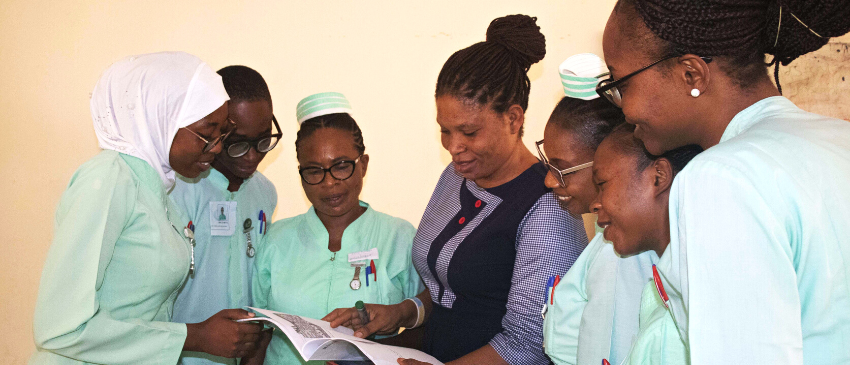
Strengthening Nursing and Midwifery Education in Nigeria by Partnering to Revise and Roll Out the National Nursing and Midwifery Curricula
Nigeria faces a significant shortage of nurses and midwives, which has serious consequences on maternal and child health outcomes. The National Association of Nigerian Nurses and Midwives estimates that Nigeria needs at least 800,000 additional nurses and midwives to meet its current health care requirements[1]. In March 2020, there were 180,709 registered nurses and 126,863 midwives. For a country nearly four times the size of the United Kingdom with a population of almost 225 million people, that’s only 88 nurses per 100,000 people and one midwife for every 364 women of reproductive age.
Banyan Global is working in Nigeria to improve maternal and child health outcomes as the prime recipient of the $19-million United States Agency for International Development (USAID) Nigeria Health Workforce Management (HWM) Activity. The HWM Activity supports establishing a cost-effective, well-trained, and motivated health workforce in targeted rural and remote areas of Bauchi, Ebonyi, Kebbi, and Sokoto States and the Federal Capital Territory (FCT). HWM strengthens the pre-service training learning environment and enhances teaching faculties’ capacity to deliver state-of-the-art and gender-sensitive curricula. HWM collaborates closely with the Nursing and Midwifery Council of Nigeria, an organization that is responsible for promoting and maintaining excellence in nursing and midwifery education and practice in line with global best practices.
As part of this mandate, the Nursing and Midwifery Council is responsible for revising the national pre-service training curricula for nurses and midwives every five years. Unfortunately, the COVID-19 pandemic delayed the most recent revision well beyond that time period. Banyan Global worked closely with the Council to make up for lost time and revise and roll-out the new curriculum. To support locally-led development, Banyan Global provided a grant to the Center for Comprehensive Promotion of Reproductive Health, an academic center affiliated with the University of Ibadan in Oyo State, to assist this effort. Together, we also collaborated with the USAID/Nigeria Integrated Health Program (IHP) and Ipas, an international reproductive health care organization, to convene key stakeholders to identify areas for curricula enhancement.
HWM then provided technical and logistical support to the Nursing and Midwifery Council to hold a national-level curricula review workshop, which produced initial drafts of the improved nursing and midwifery curricula. HWM supported the Council to ensure the national pre-service training curricula was in line with global best practices and adult learning methods and add six new modules to the curricula:
- Home Healthcare Nursing
- Interpersonal Communication and Counseling
- Introduction to Nursing Informatics
- Nursing Ethics and Jurisprudence
- Nursing Politics and Governance
- Quality Improvement and Patient Safety in Healthcare
In June 2022, the Nursing and Midwifery Council of Nigeria Governing Board ratified and approved the curricula. Following its approval, HWM provided technical and logistical support to the Council for the national launch of the curricula in the FCT, which included high-level officials from USAID, the Federal Ministry of Health, the Nursing and Midwifery Council Board, the National Association of Nigerian Nurses and Midwives, the FCT Health and Human Services Secretariat, and the FCT Primary Health Care Board.
“Now the curriculum will be implemented … in a uniformed manner and produce best practices for nurses that will provide quality care for the populace … One thing I know is that the revised document is comprehensive, rich in content to train nurses to provide quality care, and comparable to other curricula anywhere in the world.”
– Abosede Bola Ofi, Nursing and Midwifery Council of Nigeria Board Chair
In late 2022 and early 2023, HWM provided additional technical and logistical support to the Nursing and Midwifery Council for curricula dissemination and tutor orientation workshops in all six of Nigeria’s six geographical zones (North-Central, North-East, North-West, South-East, South-South, and South-West). Each of the workshops oriented about 90 tutors.
In collaboration with the USAID Breakthrough ACTION-Nigeria Project, IHP, and the MOMENTUM Country and Global Leadership Project, HWM also provided technical and logistical support to the FCT Schools of Nursing and Midwifery, Gwagwalada for a curricula orientation, adoption, and adaptation workshop. Based on the workshop experience, HWM developed a how-to guide on institution-level curricula adoption and adaptation. HWM went on to provide support to seven pre-service health training institutions in Ebonyi State to use the how-to guide in their curricula orientation, adoption, and adaptation workshops. HWM will provide similar support to pre-service training institutions in Bauchi, Kebbi, and Sokoto States.
For us, it doesn’t end in curriculum review, but to ensure that the curriculum is adopted in all the Nursing Schools, that the nurses get the requisite trainings. To ensure that our curriculum in Nigeria can compete favorably well with any country of the world.”
– Anddy Omoluabi, HWM Country Director
Through its work at the federal, zonal, and state levels, HWM has improved the quality of pre-service training of nurses and midwives in over 290 training institutions across Nigeria. The HWM-supported curricula revisions, training, and resources will improve maternal and child health in Nigeria, paying dividends for generations to come.
[1] The development Research and Projects Centre, January 17, 2023, https://twitter.com/drpc_nig/status/1615302349655887876.
